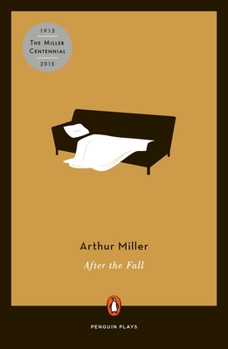After the Fall: A Play in Two Acts
Select Format
Select Condition 
Book Overview
Arthur Miller has set this devastating play inside a mind. The mind belongs to Quentin, a lawyer with a lofty reputation and a prosecutor's zeal for pursuing the finest threads of guilt. Yet the guilt... This description may be from another edition of this product.
Format:Paperback
Language:English
ISBN:0140481621
ISBN13:9780140481624
Release Date:December 1980
Publisher:Penguin Books
Length:114 Pages
Weight:0.27 lbs.
Dimensions:0.4" x 5.0" x 7.9"
Age Range:18 years and up
Grade Range:Postsecondary and higher
Customer Reviews
4 ratings
Looking for Love While Coming to Terms with Guilt
Published by Thriftbooks.com User , 16 years ago
The Biblical title "After the Fall" provides clues to what this play is about. Miller uses sophisticated language and characters [an attorney, Quintin, and a singer, Maggie, which appear to be stand-ins for Miller and Marilyn Monroe], to present a serious drama about the primary problem of mankind, for which Christ died on the Cross to try to relieve man's pain: guilt. Guilt is dealt with on three different levels in this play: in love relationships, on the political level represented by the House UnAmerican Activities Committee (HUAC), and on the more universal level represented by the Holocaust. Guilt is a killer, which is why it's the major theme of the Bible, as well as of this play. It makes people emotional cripples. Guilt has been a problem that man has had to deal with ever since "after the fall" when Adam and Eve disobeyed God. Besides guilt, although its connected, another theme is people in relationships demanding perfect love--that only God can give--from imperfect people. In one scene, Maggie says: "Jesus loved Lazarus, didn't he?" Maggie is identifying here with Lazarus. Jesus brought him back to life after he died. That's what she wants from Quintin: for him to make her feel alive. This is the kind of love that she needs and is demanding from Quintin. She is using guilt to punish Quintin because he can't love her, on the level of Jesus's love for Lasarus. No man can. It's an unrealistic expectation, but that is the kind of love that the love-starved Maggie needs in order to survive, but she can't find it, because she is looking for a love from a man that only God can give. And the reason that Quintin, or any man, can't give that kind of love is because of guilt. Christ could give that kind of love, which he demonstrated on the Cross, when He died for mankind so men wouldn't have to have guilt, if mankind came to understand God's perfect love. Making another to feel guilty kills love between people. [It's what people mean when they say "Don't lay a guilt trip on me." In this play, Maggie and Louise are laying tremendous guilt trips on Quintin. This kills relationships.] Maggie, as well as Quintin's herridan of a wife, Louise, are punishing Quintin because he can't love like Christ. Maggie says to Quintin that he is her God, but that's just too much responsibility for him, or any man, to live up to. When Quintin fails at that kind of love--because he isn't God, but only a man--Maggie can't deal with it and self-destructs. With her suicide attempts, she is also trying to kill Quintin with guilt. To quote Quintin: "Suicide kills two people." When one tries to kill themselves, they usually are trying to kill someone else, too, and they're using guilt to do it. The character of Holga is much more mature than the other two women, Maggie and Louise, but even Holga is crippled by guilt, but just a different kind. Her guilt is because she survived the death camps during the Holocaust while so many others didn't. The
Absorbing, biographical account.
Published by Thriftbooks.com User , 22 years ago
I seem to remember Arthur Miller dismissing the notion that this Book is biographical, but it certainly reads that way....One can not help but draw comparison to marilyn monroe fromthe maggie character...in a most unfavorable way.The main character's relationship with the various characters in this book reveal Arthur Millers feelings about his own Life...it's almost like a comment on his marriage to the movie legend and an explanation what happened to her.As a Marilyn fan i find this to be an interesting read and a glimpse into Arthur Miller's side of it all.
Where do we go from here?
Published by Thriftbooks.com User , 23 years ago
Everyone's read Death of a Salesman and The Crucible, myself included... but in my opinion, this play is Miller's most exceptional work! It is presented in a much less formulaic, more postmodern arrangement than his other works. He tackles goodness and sin in a manner uniquely his own, examining what modern man must seek out in life. He offers a hope for humankind which can only be achieved by the acknowledgement that we all exist "after the fall" from innocence and the necessity of each of us to relearn to live and to love in our way.
Arthur Miller's Hidden Gem
Published by Thriftbooks.com User , 24 years ago
With themes such as innocence, responsibility, self-examination, betrayal, and more, this is a far reaching, hard hitting play. A semi-autobiography, this play works on several levels; it breaks the fourth wall, but is also powerful outside the narration, it has a complex theme that is slowly discovered, but it's scenes are urgent andeffective. A great play for a casual read, an amazing source of scenes, and a wonderful play for production





